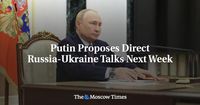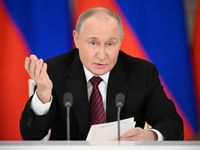In a significant diplomatic overture, Russian President Vladimir Putin has invited Ukraine to resume direct negotiations in Istanbul on May 15, 2025. This proposal comes amid a concerted push by Ukraine and its Western allies for a 30-day ceasefire with the Kremlin, aimed at de-escalating the ongoing conflict that has persisted since Russia's full-scale invasion in February 2022.
Putin's invitation, made on May 11, 2025, emphasizes a desire for talks "without delay or any preconditions." He expressed that the discussions could begin as soon as Thursday, May 15, in Istanbul, a location where previous negotiations had been held and subsequently interrupted. The Russian leader stated, "We are set on serious negotiations with Ukraine," aiming to address the "root causes of the conflict" and establish a long-term peace.
This diplomatic initiative follows a significant meeting in Kyiv on May 10, where leaders from Ukraine, France, Germany, Poland, and the United Kingdom gathered to advocate for an unconditional ceasefire beginning May 12. During this meeting, they voiced their support for Ukraine and warned that failure to agree to a ceasefire could result in "massive" new sanctions against Russia.
Putin’s proposal did not directly respond to these calls for a ceasefire but highlighted his willingness to negotiate. He plans to consult with Turkish President Recep Tayyip Erdoğan about hosting the talks, further underscoring Turkey's role as a potential mediator in the ongoing conflict.
In his statement, Putin reiterated that Russia is prepared for "serious negotiations" and does not rule out the possibility of establishing a new truce during the discussions. He noted, "We do not exclude that during these talks we will be able to agree on some new ceasefire." However, he also criticized European leaders for what he termed "ultimatums" and "anti-Russian rhetoric," suggesting that such pressures would not yield productive results.
The backdrop to this diplomatic maneuvering is a conflict that has resulted in the deaths of hundreds of thousands of soldiers and displaced millions since its inception. The war has drawn stark lines between Russia and the West, with Western nations, including the United States, expressing strong support for Ukraine.
Earlier in the week, U.S. President Donald Trump had a joint phone call with European leaders, reinforcing their call for a ceasefire and expressing his backing for Ukraine. Trump later remarked on his social media platform that Putin's proposal could represent a "potentially great day for Russia and Ukraine," emphasizing the importance of achieving peace and saving lives.
Despite the diplomatic overtures, Russia has maintained its stance on certain conditions for peace. In June 2024, Putin had articulated that Ukraine must formally abandon its NATO ambitions and withdraw its forces from territories claimed by Russia. These demands have been met with skepticism from Kyiv and its allies, who view them as non-starters.
The history of negotiations between Russia and Ukraine has been fraught, with previous talks failing to yield a sustainable resolution. The last direct discussions occurred in early 2022, soon after the invasion began. Since then, both sides have accused each other of violating ceasefires and escalating hostilities.
In a statement from the Kremlin, spokesperson Dmitry Peskov noted that while Russia supports the idea of a ceasefire, it requires addressing certain "nuances" before committing to any terms. He stated, "It is a new development, but trying to pressure us is quite useless," indicating a reluctance to yield to external pressures.
As the situation continues to evolve, the international community watches closely. The leaders in Kyiv have made it clear that any ceasefire must be genuine and not merely a prelude to further military actions. Ukrainian President Volodymyr Zelensky has previously stated his readiness for peace talks, but only after a ceasefire is firmly established.
The call for a ceasefire has been echoed by various factions within Ukraine and its supporting nations, emphasizing the urgent need for a pause in hostilities to facilitate meaningful dialogue. The leaders in Kyiv have expressed their commitment to achieving a long-lasting peace, which they believe can only be attained through genuine negotiations.
As the proposed date for negotiations approaches, the response from Ukraine remains to be seen. The Ukrainian government has yet to publicly comment on Putin's latest proposal, and the dynamics of the situation are complex, with both sides entrenched in their positions.
In conclusion, while Putin's invitation to negotiate marks a potential turning point in the conflict, the path to peace remains uncertain. The international community's response, the willingness of both parties to engage in meaningful dialogue, and the broader geopolitical implications will all play crucial roles in shaping the future of Ukraine and its ongoing struggle for sovereignty.


